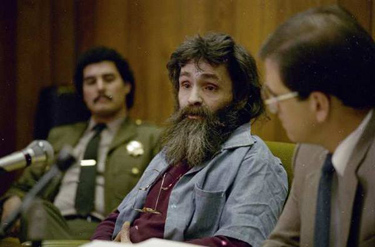
Charles Manson at a 1986 parole hearing. (Associated Press)
The Obama administration doesn't want dangerous prison inmates, such as convicted mass murderer Charles Manson (pictured, right), to make calls or send text messages from contraband cellphones because of the possibility that they could direct new crimes.
But federal officials also don't want to go so far in trying to jam those communications that they create problems for nearby public safety workers or average citizens, according to a new government report. A possible solution: more limited technologies that would let prison officials block calls only from unapproved devices, the report said.
"The administration believes that contraband cellphone use by prison inmates to carry out criminal enterprises is intolerable and demands an effective solution," the Commerce Department said in the 58-page report. "Prison officials should have access to technology to disrupt prison cellphone use in a manner that protects nearby public safety and federal government spectrum users from harmful disruption of vital services, and preserves the rights of law-abiding citizens to enjoy the benefits of the public airwaves without interference."
In late 2009, Congress directed government officials -- including the Federal Communications Commission, the Federal Bureau of Prisons and the National Telecommunications and Information Administration -- to look into technologies that could prevent the use of cellphones by inmates.
A law enacted in August bans cellphones from federal prisons, but it does not apply to state facilities. In California state prisons, for example, inmates are not supposed to have cellphones, but there is no law that makes possessing one a crime or that imposes penalties on visitors who smuggle them in.
The issue gained new attention last month when The Times reported rampant use of contraband cellphones in state prisons, including by Manson, who was caught hiding a cellphone under his mattress.
"A cellphone these days, it seems, is something the average American cannot live without. Apparently, neither can the nation's inmates, and it is a major public safety concern," Jamie Barnett, chief of the FCC's Public Safety and Homeland Security Bureau, said in a blog post about the goverment report. "Today, prisons across the nation are reportedly confiscating thousands of cellphones from inmates monthly, yet this contraband is still being used by inmates daily."
The number of cellphones confiscated in California prisons has jumped dramatically since 2007, state officials said. The FCC has resisted calls to allow prison officials to jam cellphone signals. Barnett said the federal Communications Act disallows such jamming devices, so Congress would have to change the law. And jamming can interfere with nearby police, fire and other emergency communications systems.
The Commerce Department report makes no recommendations, instead reviewing the pros and cons of different technologies to stop inmates from making calls with contraband cellphones.
This year California will test one technology, called managed access, with which officials can block calls that do not come from a list of phones approved to transmit through nearby towers. The system enabled Mississippi state officials to block more than 216,000 unauthorized calls and text messages in its first month in operation last summer.
The Commerce Department report goes to Congress, which could consider legislation.
California also could enact new laws. Former Gov. Arnold Schwarzenegger vetoed a bill last year that would have imposed a $5,000 fine on anyone caught giving a cellphone to a prisoner, arguing that it wasn't tough enough.
The bill's sponsor, state Sen. Alex Padilla (D-Pacoima), hopes to try again this year with Democrat Jerry Brown as governor.











